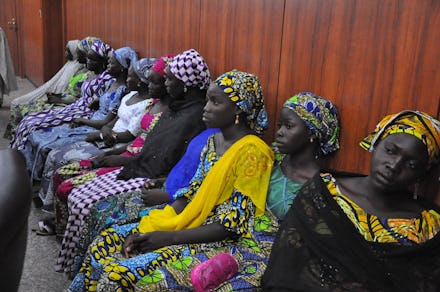These Brave Nigerian Escapees Are Taking a Powerful Stand Against Boko Haram

In April 2014, Boko Haram militants kidnapped 276 schoolgirls from a boarding school in the northeastern Nigerian village of Chibok. Soon after the initial abduction, 57 of the girls, most between the ages of 15 and 18, escaped.
Now, in a powerful act of bravery, a group of the escapees have elected to return to their education — a defiant decision that runs counter to the warnings of Boko Haram, whose name loosely translates to "Western education is forbidden."
Facing threats of violence against themselves and their families if they continued with their schooling, 21 of the girls recently began attending classes at the American University of Nigeria, a private school in the city of Yola, more than 160 miles from Chibok. Some are studying to become doctors and engineers; the university has allowed them to utilize science labs, microscopes and the mentorship of professors and educators.
"Education is scary," one of the girls' mothers told the school when she dropped off her daughter, according to the Guardian. "So many people have discouraged us and told us we should not put our girls in school or they will be kidnapped again. We are entrusting our children to you."
How did this come to be? These girls have a 27-year-old woman named Godiya to thank. Godiya's sister was among those kidnapped; after her sister escaped the militant group, Godiya went to Margee Ensign, her boss at the American University of Nigeria, to ask what could be done for the girls who had escaped and who were languishing back in Chibok.
Ensign set up a campaign called #EducateOurGirls, which has raised more than $90,000 in education funds for the girls. Godiya initially had trouble recruiting students — many families were terrified to place their daughters into the same situation that precipitated the initial kidnappings.
Though she eventually compiled a list of girls, the journey to Yola was a difficult one. The Globe and Mail reports that Godiya traveled with two buses stamped with the logo of the American University of Nigeria — a dangerously direct challenge to Boko Haram.
The girls ultimately arrived safely and, according to reports, have flourished. "They've been through hell and back, and they must feel terrible for their friends who haven't come back, and yet they are still upbeat," Jessica Boyd, a professor who runs the university's natural and environmental sciences program, told the Globe and Mail.
Their defiance echoes that of another powerful young woman. The youngest Nobel Prize laureate took similar steps in the wake of her own attack. After Malala Yousafzai survived an assassination attempt by a Taliban gunman in 2012, she became one of the world's most prominent global advocates for education, particularly the education of young girls.
After the kidnapping in Chibok, Yousafzai took up the cause of the abducted schoolgirls: "Bring back our girls, now and alive," she had said in July.
Like Yousafzai, the 21 schoolgirls have sent the rest of the world a strong message: By doing exactly what their enemies are most afraid of — receiving an education — they're refusing to accept anything less that what they desire and deserve. It is a remarkable act of defiance, and one that shouldn't be taken lightly. In the face of abject violence and fear, a group of teenagers and their families have elected to stare right back.
"They've been given a chance, and they're not going to waste it," Boyd told the Globe and Mail. "I have a lot of hope for the future of Nigeria after meeting these ladies."
h/t the Guardian